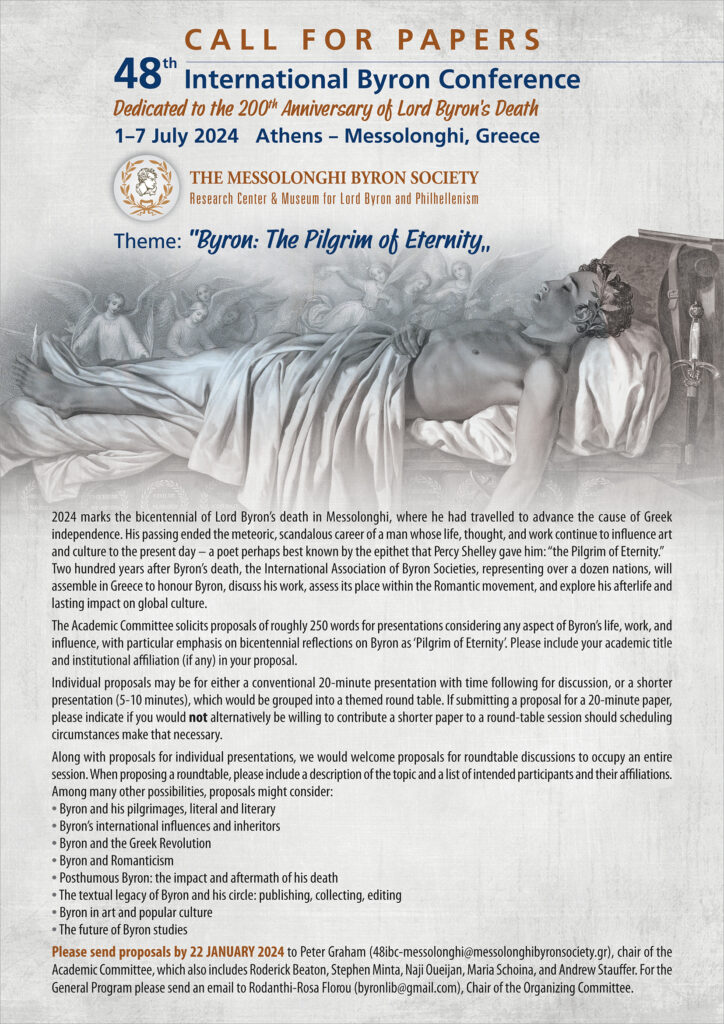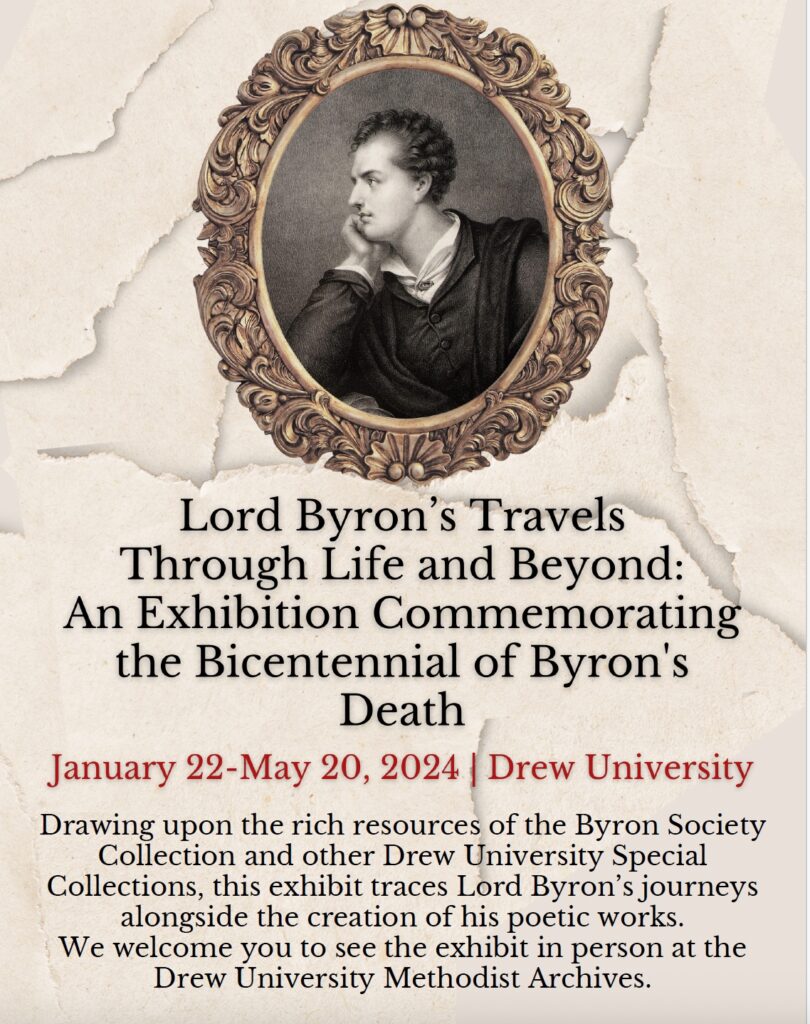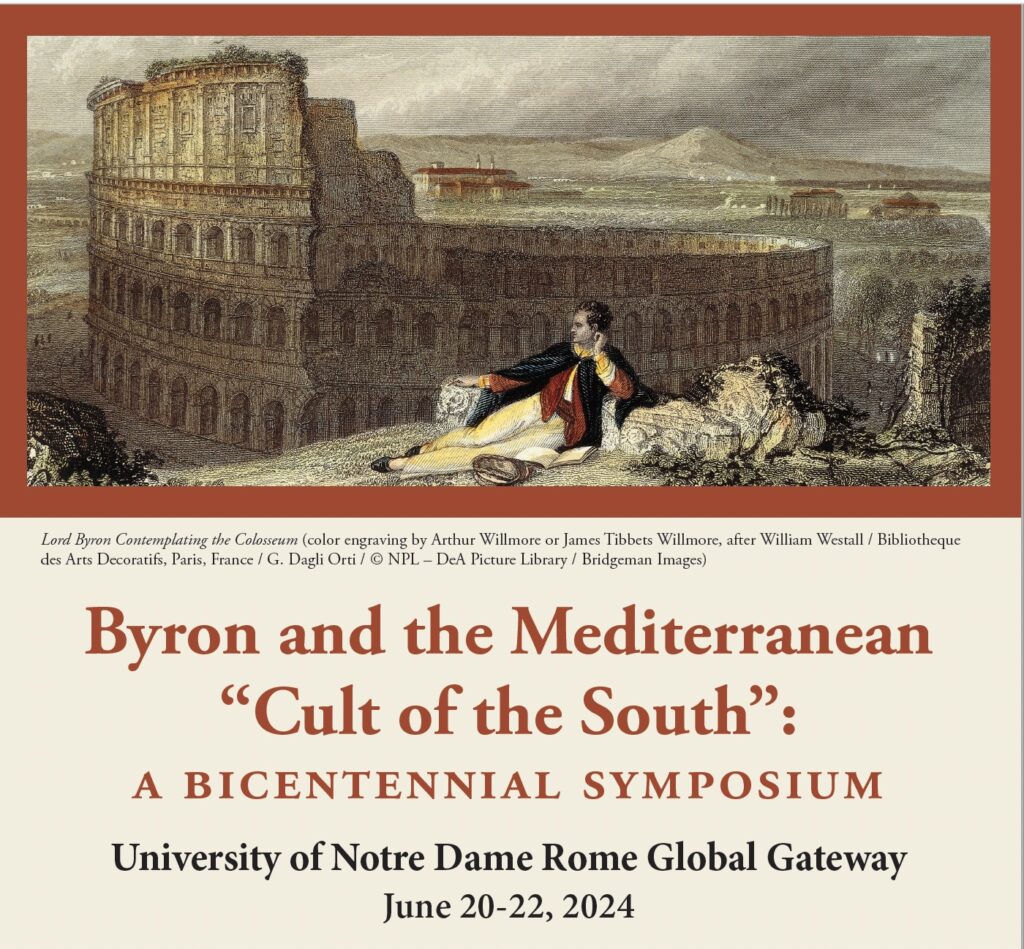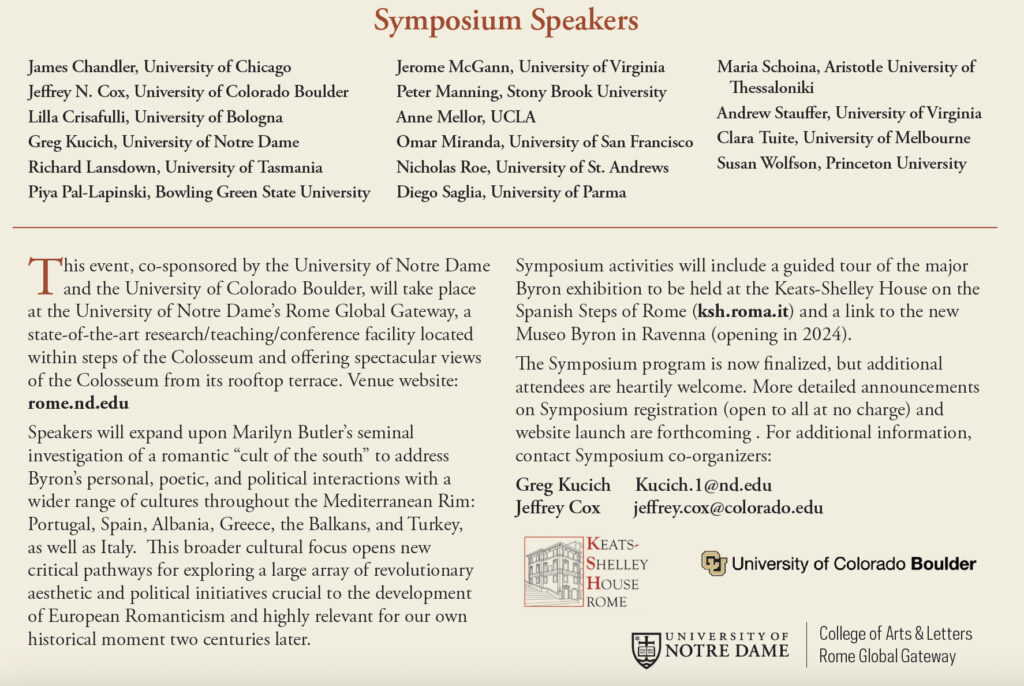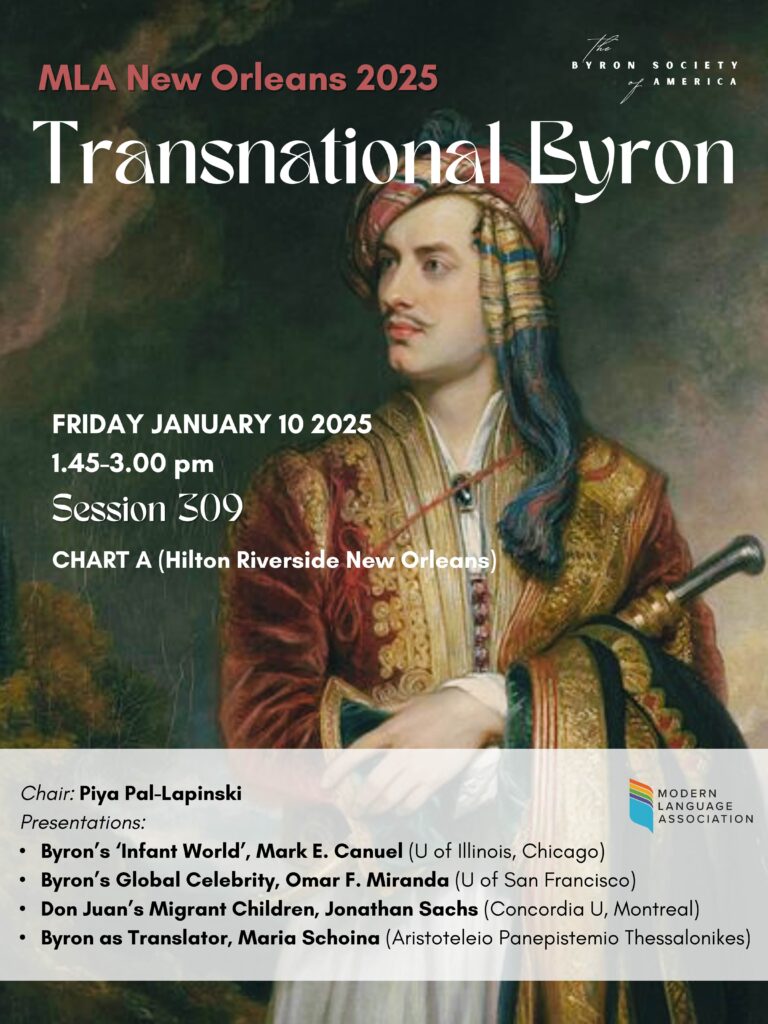
Author: Andrew Stauffer
2024 Curran Symposium: SARDANAPALUS & “Performing Politics”
Friday, October 24-25, 2024
- New York University, Palladium Hall 140 East 14th StreetNew York, NY, 10003United States (map)

Organizers: Elizabeth Effinger, University of New Brunswick, Robin Hammerman, Stevens Institute of Technology, and Kaila Rose, Communications Officer for The International Association of Byron Societies
The 2024 Curran Symposium, “Performing Politics,” will honor the bicentennial of Lord Byron’s death by engaging with some of the most pressing public issues in the lives of Byron and his contemporaries that carry through to our own turbulent lives in 2024. We take this moment to examine how such conflicts rage on “dubiously and fiercely,” and to consider how art reacts to and reimagines such acts of theatrics and turmoil (Sardanapalus, Act III.i.198).
This symposium will be one full day of panels and discussions, taking place on October 25th, 2024 at NYU’s Palladium Hall in New York City. The symposium festivities will also include a special production of Byron’s Sardanapalus at The Red Bull Theater (NYC) on Thursday, October 24th.
Staging Byron’s closet drama enables us to think about the difference between intentions for privacy, audience, and writing narratives of legacy. How might acts or performances (broadly conceived) help usimagine a new time and place? What are our stories of political transformation? And what does the actof going public, of sharing these stories, activate for us as citizens, scholars, and artists, those“unacknowledged legislators of the World” as Shelley famously put it?On the 25th, the symposium, which includes both in-person and virtual components, will feature invited speakers addressing a diverse range of performances and politics in the work of Byron and his Romantic contemporaries. During the evening’s drinks and appetizer reception, we will also feature a digital presentation of the artwork from the special creative project we have designed: “Uncloseting Byron”—a public art project that takes a creative, experimental approach to closet drama by using Byron as its starting point. Beginning with a line from one of Byron’s plays, participants create short mixed-media closet dramas and share them via social media. As we not only get off the stage but also off the page for this project, we tarry with how this act of performance might become a space of freedom.
SCHEDULE
Thursday 24th 2024
7:30 pm Sardanapalus at The Red Bull Theatre — Sheen Center
Post-show Talk-back to follow
Friday 25th 2024, NYU’s Palladium Hall
8:45am – 9:15am Coffee and Tea
9:15am – 10:00am Post-Sardanapalus Production Roundtable
Panelists: Omar F. Miranda (University of San Francisco) – moderator, James Armstrong (City College NY), Michael Gamer (U Penn)
10:00am – 10:15am Coffee and Tea Break
10:15am – 11:30pm Panel One: Poetics and Biopolitics, War, Incarceration
Chair: Arden Hegele (Columbia University)
Panelists: John Havard (Binghamton), Michael Demson (Sam Houston), Mariam Wassif (Carnegie Mellon)
11:30am – 11:40am Coffee & Tea Break
11:40 am – 12:30 pm Discussion: Byron and Gender Revisited
Panelists: Gerard Cohen-Vrignaud (University of Tennessee, Knoxville) and Kate Singer (Mount Holyoke College)
12:30 – 2pm Lunch Break
2pm – 3:15pm Panel Two: Politics of Performing the Future
Chair: Amal Bou Sleiman (International Association of Byron Societies)
Panelists: Emily Rohrbach (Durham, UK), David Sigler (Calgary), Marc Gotthardt (Cambridge U)
3:15pm – 3:30pm Break
3:30pm – 4:45pm Panel Three: Our Everlasting Flame: Engaging with
Romanticism’s Enduring Foundations
Chair: Tom Mole(Durham University, UK)
Panelists: Elizabeth Denlinger (Pforzheimer Collection in the NYPL); Marsha Manns (BSA); Alice Levine (BSA); Andrew Stauffer (UVA); Jonathan Sachs (Concordia)
4:45pm – 5:45pm Keynote
Chair: Alice Levine(Hofstra University)
Jerome McGann (UVA)
5:45pm – 6:15pm Closing Remarks by Kate Singer, Closet Drama & Commonplacing Showcase, Kaila Rose (Byron Society of America) and Olivia Moy (Lehman College, CUNY)
6:30pm – 8:30pm
Reception at The Penny Farthing,
103 3rd Ave, New York, NY 10003
Celebrate Bacchanalia by joining us for drinks & appetizers!
Register for the day here!
ADDITIONAL ACTIVITIES
On Wednesday 23rd October, 4pm EST, the Byron Society of America will be hosting the 14th Leslie A. Marchand Lecture at Drew University, organized by Marsha Manns. Dr. Tom Mole, Principal of Van Mildert College, Durham, will be giving a talk in Drew’s Special Collections Library, where the BSA archives are housed. The lecture will be followed by a reception and tour of the BSA’s Collection.
- Drew University, 36 Madison Ave, Madison, NJ 07940
- https://drew.edu/
HOTEL SUGGESTIONS
As we do not have an official hotel partner for the event, here are some suggestions of affordable options close to Union Square:
The Chelsea Inn: https://chelseainn.com/
The Heritage Hotel NYC: https://www.heritagehotelnyc.com/
Freehand Hotels: https://freehandhotels.com/
Union Square Apartments NYC: https://unionsquareapartmentsnyc.com/
East Village Hotel NYC: https://www.eastvillagehotelnyc.com/
The Holiday Inn: https://www.ihg.com/holidayinn/hotels/us/en/new-york/nycvc/hoteldetail?cm_mmc=GoogleMaps-_-HI-_-US-_-NYCVC
Broadway Plaza Hotel: https://www.broadwayplazahotel.com/?utm_source=google&utm_medium=organic&utm_campaign=business-listing
MLA 2025: New Orleans – “Transnational Byron”
Happy to announce our MLA session for January 2025 in New Orleans:
“Transnational Byron”
Session Chair, Piya Pal-Lapinski, Associate Professor of English, Bowling Green State University
Byron’s experiences in Europe and the Eastern Mediterranean, including the global impact of his poetry, position him uniquely as a transnational figure. This panel explores transnational contexts in Byron’s work and discusses the significance of these interventions in an increasingly fractured global scenario which marks the current moment. Offering fresh interpretations of major works, the session focuses on topics such as Byron’s global celebrity; the way The Island frames political revolution in the context of the Columbian, Ecuadorian, and Greek revolts, creating spaces for new ideas related to progressive political communities, asylum and refugee discourse; Don Juan as an epic of child migration which engages with the nightmarish precarity of the migrant situation, from shipwreck and sexual exploitation to slavery; and the way Byron’s translating activity unsettles the idea of a national language/culture, drawing attention to difference and forging new coalitions.
Participants:
Mark Canuel, “Byron’s ‘Infant World,’” Professor of English, University of Illinois, Chicago
Omar Miranda, “Byron’s Global Celebrity,” Associate Professor of English, University of San Francisco
Jonathan Sachs, “Don Juan’s Migrant Children,” Professor of English, Concordia University, Montréal
Maria Schoina, “Byron as Translator,” Associate Professor, School of English, Faculty of Philosophy, Aristotle University of Thessaloniki, Greece
CFP: IABS conference: “Byron: Pilgrim of Eternity,” Greece, 1-7 July 2024
Newstead Abbey Byron Conference, April 26-27
“Provocative and Provoking: Fifty Shades of Byron”
2024 marks the bicentenary of Lord Byron’s death. It is therefore fitting that the 2024 Newstead Abbey Byron Conference not only commemorates his death but also celebrates the life and works of both the multifaceted man and his dazzlingly diverse poetry. The theme for this year’s conference, “Provocative and Provoking: Fifty Shades of Byron” has been chosen to encourage papers exploring every aspect of Byron’s life, his poems, and his contemporary and current reception across the globe.
KEYNOTE: Professor Andrew Stauffer (Virginia), “Byron: A Life in Ten Images.”
We could offer a lengthy list of potential topics, but it would be impossible to include them all.
So instead, we invite you to join us and discuss your Byrons – the poet and the playwright, the lover and the misanthrope, the pacifist and the warleader, the atheist and the spiritualist, the witty correspondent and the shrewd satirist. We also invite you to share your insights and observations regarding Byron’s poems, the profound fluctuations in his popularity over the last two hundred years, and the enduring significance of the poet and his poetry for so many cultures and communities today.
The conference will be held in Newstead Abbey, and delegates will have the opportunity to tour the house and gardens during the conference. In addition, to mark this special occasion, we will also be expanding the conference to include additional cultural events, both in the Abbey and at nearby locations connected with Lord Byron and his family. Details will be made available later in the year once the events are finalised.
The deadline for the Call for Papers is the 2nd of January. Please send abstracts of no more than 300 words, together with a short professional biography (of no more than 100 words), to Dr Emily Paterson Morgan (newsteadbyronconference@gmail.com).
The Byron Society will be providing a small number of bursaries for students and early career researchers. Details will be made available later in the year. If you would like to be considered for one of the bursaries, please include a short statement in your submission, outlining why you require the bursary.
Byron Symposium at Trinity College Cambridge: April 19-20, 2024
Trinity College Cambridge will host a two-day event to coincide with the 200th anniversary of Lord Byron’s death on 19 April 1824, in Missolonghi, Greece. Byron was a student at Trinity College and is one of its most celebrated alumni.
While enrolled as an undergraduate, Byron published his collection of poetry, Hours of Idleness, and began the satirical poem that would become English Bards and Scotch Reviewers, a scathing provocation of the literary establishment.
Described by the College’s Senior Tutor as a ‘young man of tumultuous passions’, Byron soon became one of the most controversial, celebrated, and influential poets of his age. When Westminster Abbey declined to accept the magnificent statue of Byron, created after his death by the Danish sculptor Thorvaldsen, Trinity gave it a home in the Wren Library, where the poet still stands — an impressive presence for students, scholars and visitors.
But what kinds of presence does Byron have now? This question is the focus of an exciting programme of talks, readings, music and exhibited work, which will address, and mediate, the legacy and status of Byron now, within the contexts of today’s culture and scholarship.
The programme includes:
- Talks about Byron, by academics and writers including Jonathan Bate, Bernard Beatty, Drummond Bone, Clare Bucknell, Will Bowers, Mathelinda Nabugodi, Seamus Perry, Adam Phillips, Diego Saglia, Jane Stabler, A.E. Stallings, Andrew Stauffer, Michael Symmons Roberts, Corin Throsby, Clara Tuite, Ross Wilson.
- A concert featuring settings of Byron’s poems by Schumann, Wolf and others including Hugh Wood, and a newly commissioned piece composed by Judith Weir, the Master of the King’s Music and Honorary Fellow of Trinity.
- An exhibition in the Wren Library centred around Trinity College’s extensive Byron collection, including original manuscripts, letters and first editions of works by Byron and his circle.
- Poetry readings of newly commissioned work by various poets, as well as readings of Byron’s verse.
Further information including a full programme and booking information will be available soon at www.trin.cam.ac.uk To register your interest in attending, please email byron2024@trin.cam.ac.uk
Byron Exhibition: Drew University, Jan – May 2024
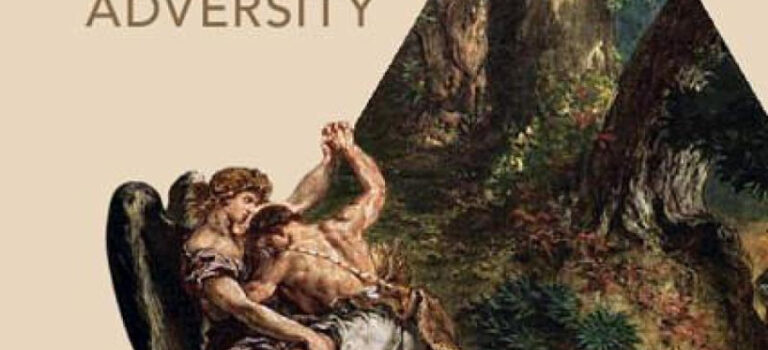
Elma Dangerfield Prize Winner: Jerome McGann
Prof. Jerome McGann, John Stewart Bryan Professor of English, has won the Elma Dangerfield award for 2023 for Byron and the Poetics of Adversity (Cambridge University Press, 2022).
The aim of the prize is to identify and reward new and original work related to the life and works of the poet Lord Byron. It is awarded to the best book (or, exceptionally, books) on Byron or a Byron-related topic published in any given year, according to the judgement of an Evaluation Committee appointed by the Joint Presidents of the IABS.
The Elma Dangerfield Prize committee in 2023 faced an enjoyably challenging and almost impossible task. Three outstanding books formed the shortlist:
– Jerome McGann, Byron and the Poetics of Adversity (Cambridge University Press, 2022)
– Bernard Beatty, Reading Byron: Poems-Life-Politics (Liverpool University Press, 2022)
– John Owen Havard, Late Romanticism and the End of Politics: Byron, Mary Shelley and the Last Men (Cambridge University Press, 2023).
However,Jerome McGann’s Byron and the Poetics of Adversity was awarded the prize on account of its dazzling originality, intellectual and historical breadth: ‘the gold standard of Byron scholarship’ as one judge expressed it. Concise, lucid and subtle, Byron and the Poetics of Adversity makes a compelling case for the political agency of Byronic poetic language. Revisiting his own earlier investigations into the relationship between the poetry of the years of fame and the ottava rima verse, McGann presents anew Byron’s perverse and adversarial encounters with artistic form, philosophy and system throughout his writing life.
Byron and the Poetics of Adversity is rigorous, stylish and occasionally polemical: it will transform our thinking about Byron’s rhetorical art.
John Galt Society Research Grant
The John Galt Society welcomes applications for a grant (of up to ₤300) to defray expenses incurred in connection with research into the works, life or influence of John Galt. Eligible expenses might include transportation to libraries or archives, lodging near libraries or archives (if distant from the researcher’s home), fees or technology costs involved in on-site or on-line access (such as copying or scanning, permissions or equipment requirements). Research projects should have the goal of shedding new light on Galt’s significance in literature, history, socio-political thought or economics. Projects that situate Galt in other fields are also welcome.
Eligible applicants are advanced graduate students (students enrolled in PhD programs at universities around the world); early career scholars (scholars whose doctoral degrees date no more than three years before the application and who have held a permanent or secure academic position for no more than three years), contingent faculty (scholars with PhD degrees who hold part-time or temporary academic positions) or independent scholars (scholars with PhD degrees who do not hold academic positions).
The Grant will be awarded annually. Previous recipients may apply for a second time, but preference will be given to first-time applicants. Applications should be emailed to the Administrator of the John Galt Society Research Grant (Dr. Craig Lamont, University of Glasgow, secjgs@gmail.com). Applications must include all of the following:
►Applicant’s name, address, email address.
►Applicant’s degree and employment status (date of PhD received or expected, institutional affiliation [or statement that the applicant is not affiliated], length of affiliation and whether the position is full-time or part-time, permanent or temporary.
►Applicant’s cv.
►Description (approximately 1,000 words) of Applicant’s project, specifying what portion or aspect of it is to aided by the Grant and what specific use of the Grant money will be made. The timetable for carrying out the research should also be indicated.
►The name, address, email address and affiliation of a scholar whom the Applicant has asked to recommend the project. Applicants should make this request of a scholar familiar with the Applicant’s work and ask the scholar to send the recommendation directly to the Administrator of the John Galt Research Grant.
The deadline for applications is 31 January 2024. Complete applications must be received by the deadline in order to be considered. The recipient will be announced at the time (usually in March) of the Annual General Meeting of the John Galt Society. It is expected that the research will be carried out and a report submitted within a year of the receipt of the Grant. It is expected that the recipient will join the John Galt Society (if not already a member) before making use of the Grant.
Inquiries may be directed to Dr. Craig Lamont, Secretary-Treasurer of the John Galt Society and Administrator of the John Galt Society Research Grant (secjgs@gmail.com) or to Dr. Regina Hewitt, Chair of the John Galt Society (hwt87@earthlink.net)
